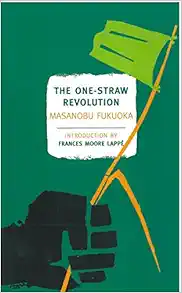
 7
7





If you'd like to add your own review, please have the first sentence be "I give this _______ X out of 10 acorns."
 1
1




Brenda
Bloom where you are planted.
http://restfultrailsfoodforestgarden.blogspot.com/
 3
3




 1
1




My blog: http://simplicityforjulia.com/
 2
2




 3
3






Gert in the making
 4
4





Outdoor and Ecological articles (sporadic Mondays) at http://blog.dxlogan.com/ and my main site is found at http://www.dxlogan.com/
 1
1




 2
2








 1
1




Homesteading in Central Virginia
Our Website





Works at a residential alternative high school in the Himalayas SECMOL.org . "Back home" is Cape Cod, E Coast USA.
 4
4




bee well
 4
4






The usual way to go about developing a method is to ask 'How about trying this?' or 'How about trying that?' bringing in a variety of techniques one upon the other. This is modern agriculture and it only results in making the farmer busier.
My way was opposite. I was aiming at a pleasant natural way of farming which results in making the work easier instead of harder. 'How about not doing this?' How about not doing that?'- that was my way of thinking. I ultimately reached the conclusion that there was no need to plow, no need to apply fertilizer, no need to make compost, no need to use insecticide. When you get right down to it, there are few agricultural practices that are really necessary.
The reason that man's improved techniques seem to be necessary is that the natural balance has been so badly upset beforehand by those same techniques that the land has become dependent on them.

If nature is left to itself, fertility increases. Organic remains of plants and animals accumulate and are decomposed on the surface by bacteria and fungi. With the movement of rainwater, the nutrients are taken deep into the soil to become food for microorganisms, earthworms, and other small animals. Plant roots reach to the lower soil strata and draw the nutrients back up to the surface.
If you want to get an idea of the natural fertility of the earth, take a walk to the wild mountainside sometime and look at the giant trees that grow without fertilizer and without cultivation. The fertility of nature, as it is, is beyond reach of the imagination.

The important thing is knowing the right time to plant. For the spring vegetables the right time is when the winter weeds are dying back and just before the summer weeds have sprouted. For the fall sowing, seeds should be tossed out when the summer grasses are fading away and the winter weeds have not yet appeared.
It is best to wait for a rain which is likely to last for several days.

Striving to grow things as naturally, simply, and cheaply as possible! 
My YouTube channel
 1
1




If nature is left to itself, fertility increases. Organic remains of plants and animals accumulate and are decomposed on the surface by bacteria and fungi. With the movement of rainwater, the nutrients are taken deep into the soil to become food for microorganisms, earthworms, and other small animals. Plant roots reach to the lower soil strata and draw the nutrients back up to the surface.
The most commonly used chemical fertilizers, ammonium sulfate, urea, super phosphate and the like, are used in large amounts, only fractions of which are absorbed by the plants in the field. The rest leaches into streams and rivers, eventually flowing into the Inland Sea. These nitrogen compounds become food for algae and plankton which multiply in great numbers, causing the red tide to appear … My modest solutions, such as spreading straw and growing clover, create no pollution.
Meat and other imported foods are luxuries because they require more energy and resources than the traditional vegetables and grains produced locally … Brown rice and vegetables may seem to be coarse fare, but this is the very finest diet nutritionally, and enables human beings to live simply and directly.
John Yunker
https://www.johnyunker.com
The Tourist Trail
https://www.thetouristtrail.com
When the land has nothing left for men who ravage everything, they scour the sea.
— Tacitus
 1
1




Dave's SKIP BB's / Welcome to Permies! / Permaculture Resources / Dave's Boot Adventures & Longview Projects














 1
1




You Speak a Word. It is received by the other. But has it been received as it was Spoken?
 2
2








Flora Eerschay wrote:I give this book 10 out of 10 I even made an artwork inspired by one of these movies (Yōjinbō, "Bodyguard"). The artwork was about the contrasting views on silk - some people find it cruel, others - natural and beautiful. No one understood my intention, sadly ;)
Zone 6, 45 inches precipitation, hard clay soil








Nature as gasped by scientific knowledge is a nature which has been destroyed; it is a ghost possessing a skeleton, but no soul. Nature as grasped by philosophical knowledge is a theory created out of human speculation, a ghost with a soul, but no structure.
 3
3




“Uncertainty is an uncomfortable position. But certainty is an absurd one.”
― Voltaire
 2
2




There is madness to my method.
"Life finds a way"- Ian Malcolm
"We're all mad here" - The Cheshire Cat





 2
2




Proudly presenting RocketMassHeaters.com
A good starting point to all RMH research
How Permies.com works

 3
3




- Tim's Homestead Journal - Purchase a copy of Building a Better World in Your Backyard - Purchase 6 Decks of Permaculture Cards -
- Purchase 12x Decks of Permaculture Cards - Purchase a copy of the SKIP Book - Purchase 12x copies of Building a Better World in your Backyard












 5
5




How Permies works: https://permies.com/wiki/34193/permies-works-links-threads
My projects on Skye: The tree field, Growing and landracing, perennial polycultures, "Don't dream it - be it! "
 3
3




https://againfarmstead.com/ | @againandagainfarmstead

|
Yeah, but does being a ninja come with a dental plan? And what about this tiny ad?
The new kickstarter is now live!
https://www.kickstarter.com/projects/paulwheaton/garden-cards
|








